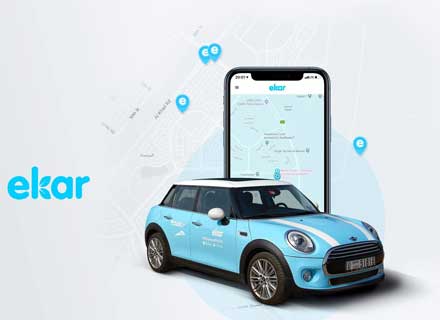UAE-based eKar is one of the leading car-sharing services in the Middle East. In today’s episode of the ‘Start-up of the Week,’ International Finance will talk about ‘eKar’ in detail, which played a significant role in revolutionising the transportation landscape in the region by offering convenient and flexible mobility solutions.
Knowing The Company In Detail
The eKar was established in 2016 to offer a substitute for conventional car ownership, reduce traffic and encourage the use of more environmentally friendly forms of transportation. The service provided residents and tourists in the United Arab Emirates with an on-demand car-sharing platform, with a mobile app.
The platform made it possible for users to rent cars for short amounts of time—often by the hour or the day—with a practical pick-up and drop-off system in locations all over cities. After booking a vehicle, users could use the app to unlock it, use it for however long they wanted, and then return it to its assigned parking space.
The eKar mobile app was created to provide a flawless user experience, making it simple to browse and book cars as well as process payments. In addition, the business offered customers round-the-clock customer service to help them with any problems they ran into while renting from them. The service provided a wide selection of cars to meet the needs and tastes of its users.
The eKar sought to satisfy the needs of its wide range of customers by offering a variety of vehicles, from small cars for quick commutes to larger ones ideal for family vacations. The eKar became one of the Middle East’s fastest-growing car-sharing services when it quickly increased its footprint in the United Arab Emirates.
Several factors, including a rise in the demand for adaptable transportation options, effective service delivery, and rising public awareness of the advantages of car-sharing, were cited as contributing to its growth. The company promoted the idea that using shared vehicles could reduce the overall number of cars on the road, thereby reducing traffic congestion and carbon emissions in urban areas. It also highlighted the environmental benefits of car sharing.
Challenges And Future Prospects
Even though eKar has come a long way, traditional transportation options and other car-sharing services in the area still pose a threat. There were obstacles to overcome, such as rivals and shifting market conditions, which called for constant innovation and adaptation.
The prospects for eKar appeared bright, given the growing interest in environmentally friendly transportation options and the expanding acceptance of sharing economy concepts. The company’s goals were to enhance user experience, add more services, and possibly investigate new technological developments like driverless and electric cars.
Planning To Expand
The ekar plans to more than double its Saudi Arabian workforce this year due to the Kingdom’s growing demand for its services, Vilhelm Hedberg, a Norwegian businessman and founder of ekar said.
“The ekar has a strong regional presence with offices in Abu Dhabi, Dubai and Riyadh and a staff of 104, with 32 based in Riyadh. As the company looks to continue growing and expanding over the next few years, the expectation is to have a staff count of over 200 by December 2021, with over 70 of them expected to be based in Saudi Arabia,” Vilhelm Hedberg told Arab News.
Since ekar is a private company, it does not disclose its financial information. However, it did report that in 2020, despite travel restrictions brought on by the coronavirus pandemic, business grew by 16.3% year-over-year.
Moreover, eKar has become a leader in the Middle East’s car-sharing market by providing practical, reasonably priced, and environmentally friendly transportation options. Its quick expansion and dedication to offering a dependable and effective service were key factors in changing the way people in the area thought about mobility. To preserve its position and satisfy the changing needs of its clientele, experts suggest, eKar would need to keep improving its strategies—just like any other industry that is changing.

